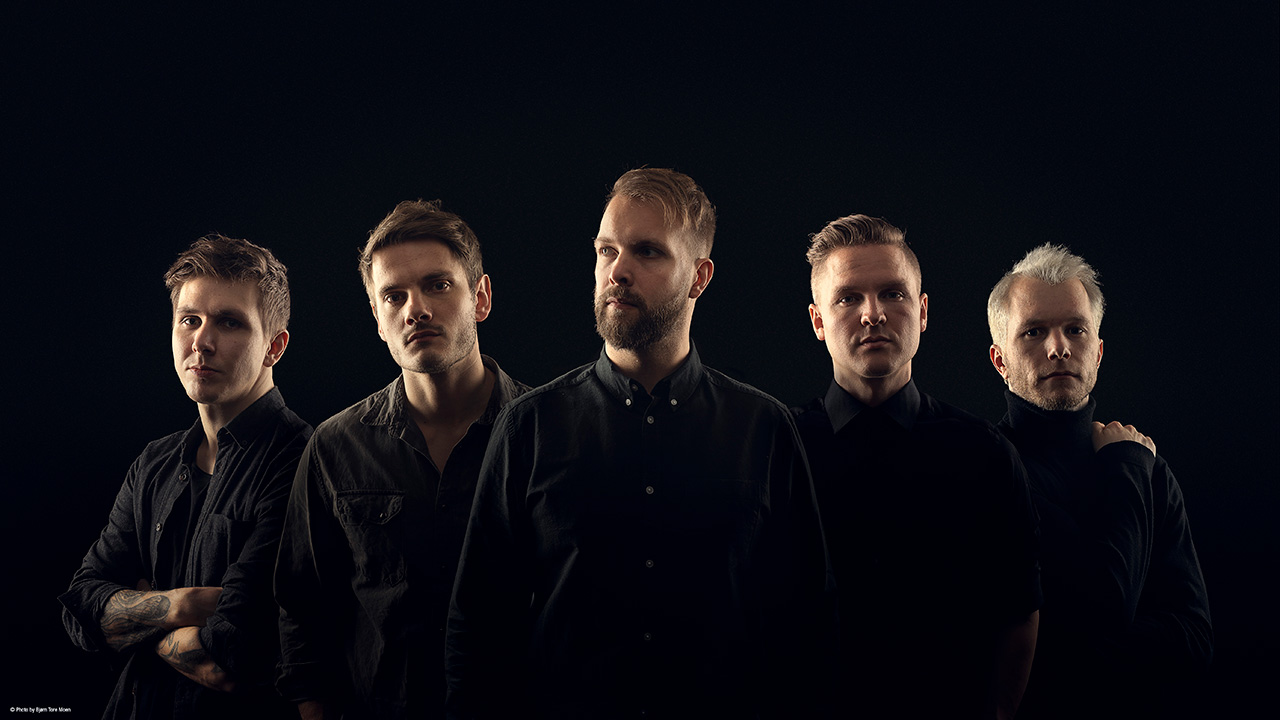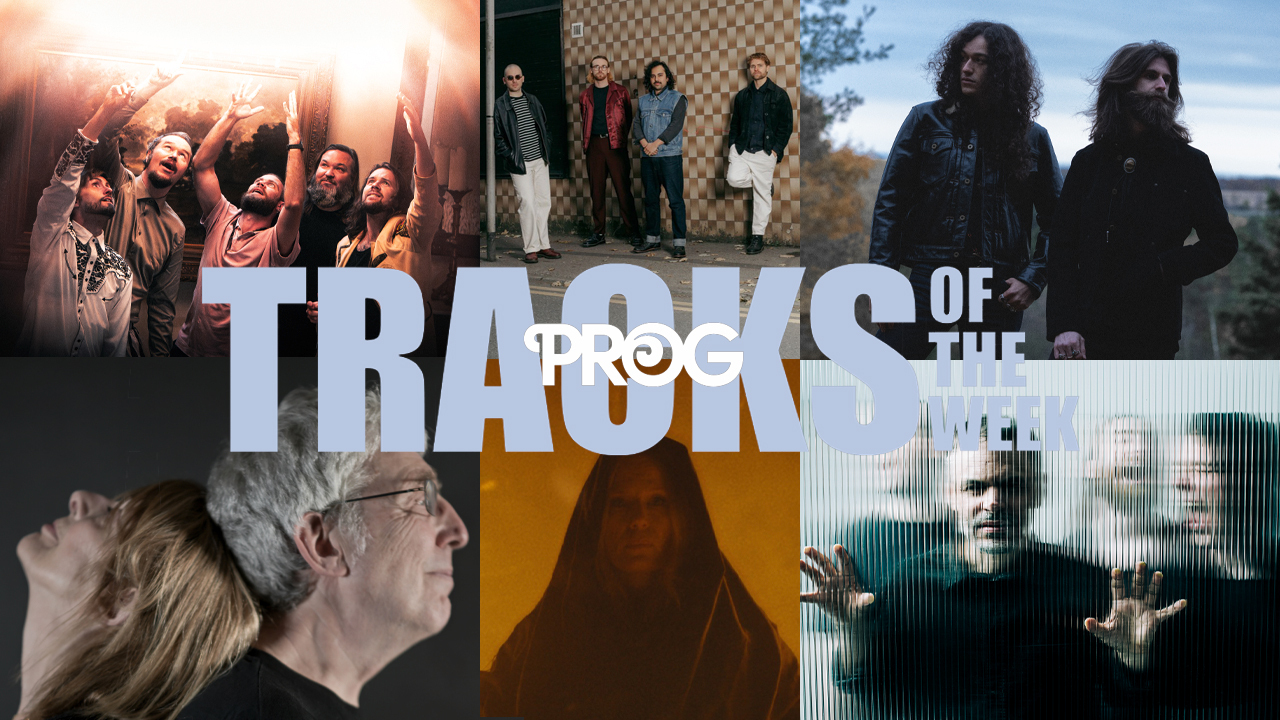The art of worrying: the inside story behind Leprous' Aphelion
Leprous frontman Einar Solberg reveals the stealth recording sessions behind 2021's Aphelion and how the positive changes he’s been making to his life are switching up the lyrics.

Select the newsletters you’d like to receive. Then, add your email to sign up.
You are now subscribed
Your newsletter sign-up was successful
Want to add more newsletters?

Every Friday
Louder
Louder’s weekly newsletter is jam-packed with the team’s personal highlights from the last seven days, including features, breaking news, reviews and tons of juicy exclusives from the world of alternative music.

Every Friday
Classic Rock
The Classic Rock newsletter is an essential read for the discerning rock fan. Every week we bring you the news, reviews and the very best features and interviews from our extensive archive. Written by rock fans for rock fans.

Every Friday
Metal Hammer
For the last four decades Metal Hammer has been the world’s greatest metal magazine. Created by metalheads for metalheads, ‘Hammer takes you behind the scenes, closer to the action, and nearer to the bands that you love the most.

Every Friday
Prog
The Prog newsletter brings you the very best of Prog Magazine and our website, every Friday. We'll deliver you the very latest news from the Prog universe, informative features and archive material from Prog’s impressive vault.
Every day, between 5pm and 5.05pm, Leprous frontman Einar Solberg allows himself five minutes to research whatever has been bothering him. Then he gets on with his evening. It’s a coping mechanism he’s established to deal with long-term health anxiety – something Prog spoke to him about in summer 2019, before the release of the brilliant, lyrically bleak Pitfalls album.
“I postpone my thoughts, basically,” he explains over Zoom, at home in Norway with his cat, Pixel. “It sounds so silly and simple, but it’s extremely efficient. Things fade away and prove themselves to be completely irrelevant.”
It’s a technique he’s been using, along with therapy, since the beginning of the year. He wanted to make a change in his life – to get a handle on the anxiety that he felt had a handle on him. “I had one New Year’s Resolution for 2021, and it was to work with my anxiety, to not let it dominate my life anymore,” he says. “And it’s been working very well, so far.”
Leprous have steadily been gathering momentum for 20 years, but 2019’s Pitfalls marked a particularly big artistic leap. It saw them push their progressive metal sound even further, upping their dramatic dynamics and bringing in more electronic accents, culminating in an epic, experimental closer, The Sky Is Red. It was also clearly the sound of a man battling his demons, and when we spoke back then, Solberg alluded to some unspoken early trauma that had clawed its way to the surface.
But if Pitfalls saw Solberg mired in the depths of his struggles, then new album Aphelion sees him pushing forwards. The emotion is still raw and real, but there are pauses for breath, and songs that speak to the process he’s been through. His therapy comes to mind during All The Moments, a semi-improvised song where he sings about ‘holding on to infant energy’, before a soaring, freeing chorus alludes to that idea of things fading away: ‘Forever is a myth/The Presence is the only thing that’s real.’
“It still covers some of the same ground with anxiety and depression, but a later stage in it, where you’ve learned better how to deal with it, and it’s a more solution-oriented approach,” Solberg explains. “It’s not dominating.”
Leprous didn’t intend to make another record so soon. It happened by stealth. They had two songs held over from the Pitfalls sessions – the uptempo Silhouette and slow-building Hold On – and decided to rearrange some other rough compositions so they’d have enough to make an EP. They ended up with four tracks. Then they recorded Castaway Angels live at the stunning Ocean Sound Recordings on the island of Giske in northwest Norway, surrounded by stunning sea vistas, and found themselves with a day-and-a-half of studio time left over. A skeleton for another track emerged. Five songs seemed too many for an EP, so they committed to a full-length record. “It was not the plan!” Solberg says with a chuckle.
Sign up below to get the latest from Prog, plus exclusive special offers, direct to your inbox!
Like every other band during the last 18 months, they’ve been working under the shadow of Covid-19. Norway’s mortality rate has been lower than most other European countries, but still, it’s a global, ever-present threat that’s been dominating the news cycle. We wonder how Solberg’s coped.
“I’m never afraid of real problems, I’m just afraid of random imagined problems that are very unlikely, haha!” he laughs. “I paid Covid very little [attention] from a health anxiety view. I was never scared of getting it.”
Still, he’s been physically unlucky in this period. In March 2020, he tore some ligaments in his ankle while out running, and the emergency services had to attend to him via boat. Two months later, he had two wisdom teeth extracted, and in February 2021 he had his tonsils taken out. That’s a lot! “It was quite a lot in one year,” he smiles. “By themselves, they’re relatively small things, that most people go through at some point. But it was a lot in one year with Covid and everything.”
Luckily, Solberg had his PlayStation 5 to distract him, and the five-minute technique – one of the reasons he’s remained so resilient. It works, he says, because you don’t allow yourself time to ruminate on an issue, especially if it’s something you can’t possibly control. “The more you try to control, the more you will obsess, and the more attention you will give to your amygdala, which sends ridiculous signals. Basically, the trick of getting anxiety to dominate less of your life is to train your brain by not giving it the attention it screams for. Whenever you want to check something with a doctor, you just don’t. Unless you’re properly sick, which has never usually been the case for me.”
He trails off. And then drops a bombshell.
“Of course, I know I had some quite bad events relatively early in my life. Like, um, when I was 16, for example, I was sure that I was going to be killed. I was beaten up by a gang of five people, and they actually ended up being imprisoned. And they said they were going to kill me and I believed them, and it’s a very obvious anxiety trigger if I say it like that.”
It’s a shock to hear Solberg speak so openly about something that must have been so devastating, especially at such a young age. But he says he didn’t take the attack seriously at the time, and tried to laugh it off because he was a teenager, not realising its impact would resurface down the line. Three years after that, he suffered another blow: his father died by suicide. He doesn’t go into the circumstances around it, but does say that substance abuse had played a part in his life.
“There is a reason why I’ve never touched alcohol or drugs myself, because I’ve had such a bad experience with it from my childhood. So I’ve always been very much against that kind of thing,” he explains. “I’ve never actually been drunk, my whole life, and I have no intention to be either.”
Solberg’s way of coping with an unpredictable world was to throw himself into Leprous, the band he formed in 2001 at age 16, releasing demos Silent Waters in 2004 and Aeolia in 2006. The first was a diverse mix of classical piano, classic rock riffing and metal screams and growls, while the second brought in more jazz rhythms and clean singing – the sounds of a band finding their feet, and doing it wholeheartedly.
“It was probably one of the reasons why I kept on going that determined with the band, because I’d found this thing that was meaningful in my life, and just went on going and going and going,” he says. “That was a bit of my problem, also, that I was just going fast-forward, fast-forward, ignore, ignore. It worked for a while, but it will eventually catch up with you.”
Life isn’t black and white, though, and Solberg is at pains to say his childhood was “both wonderful and really tough”. He has some lovely memories, particularly from his mother’s side, with their “cosy family vibe”. There were holidays to cabins and skiing, and his mother is a classical vocal coach, who taught him how to sing. There’s a photo of them together on his Instagram, embracing on the beach at Norway’s Lofoten archipelago. His caption reads: ‘My mother hates being taken pictures of, but I got this one approved! Good times.’ What does she think of her son singing about stuff that’s happened to him?
“I guess it’s fine,” he replies. “She’s completely the opposite of me; she’s not very open, so I’m not going to be open on her behalf, either. I’ve always been quite open, which is quite untypical for a Norwegian, I believe. But it never bothers me, speaking about these kinds of things. Isn’t everyone experiencing struggles? It’s not breaking news.”
The title Aphelion means ‘the point where a planet or comet is at its greatest distance from the sun’, and this album sees the band moving closer to the light. String-enhanced opener Running Low, written while Solberg was on the way up to a mountain top, is one of the most positive tracks Leprous have ever released. The life-affirming lyrics, from guitarist and co-founder Tor Oddmund Suhrke, read: ‘It’s a miracle, miracle, miracle/Now it’s liveable, liveable, liveable.’ In Solberg’s falsetto, it sounds like someone opening their curtains, looking out of their window and seeing daylight for the first time.
“He writes songs that he knows can always be relatable for me. It’s about how after a long period of struggles, you realise it’s something you can cope with. All our lyrics have become more and more transparent, basically, which is kind of nice, because then I don’t have to spend much time explaining them in interviews!”
Unfettered emotion surges across Aphelion’s 10 songs. Castaway Angels, which started life on Solberg’s acoustic guitar, sounds like something that could be performed at a late-night piano bar, but becomes increasingly impassioned. The Silent Revelation takes on a propulsive, runaway quality as Solberg’s voice hits peak falsetto. Nighttime Disguise opens with stabbing djent parts and ends with unexpected throat-shedding screams. Elsewhere, there are body-shaking electric hums (Have You Ever?) and guitar solos (The Shadow Side). It’s an absolutely astonishing album from a band at the top of their game, in a genre of one.
And as Leprous have done since Solberg’s teens, it’s helping to keep his anxiety at bay. “I know that it will come back, at some point, and I’ve made much more peace with it, and so it takes the sting out of it whenever it happens. Just like, ‘Okay, it’s one of those days,’” he explains. “We have three levels of consciousness: one of them is instinct, one of them is emotions and thoughts – which is the tricky one, because we always take it so seriously, even though it’s usually bullshit – and then there’s the more helpful part, which is analytical.”
There have been other positive changes in Solberg’s life, too – he’s moved west, from Kongsberg back to his hometown of Notodden, where he’s bought a house near his family. He’s also staying creative; today, the rest of the band are at his house working on a secret project.
Solberg’s been through so much, we wonder how he’d describe his state of mind in 2021. His answer is typically good-humoured yet nuanced. “I feel so much more relaxed. Like, fine with whatever will come my way, haha!” he grins. “However, now you’re asking me on a beautiful summer day. Ask me again in January and maybe you’ll have a different answer!”
This article originally appeared in Prog 123.

Eleanor was promoted to the role of Editor at Metal Hammer magazine after over seven years with the company, having previously served as Deputy Editor and Features Editor. Prior to joining Metal Hammer, El spent three years as Production Editor at Kerrang! and four years as Production Editor and Deputy Editor at Bizarre. She has also written for the likes of Classic Rock, Prog, Rock Sound and Visit London amongst others, and was a regular presenter on the Metal Hammer Podcast.
